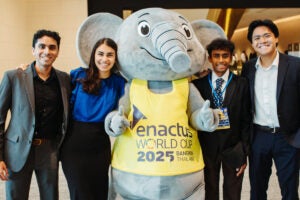This summer, 69 cyclists from the University of Texas at Austin will ride from Austin to Alaska as part of Texas 4000, the longest annual charity bike ride in the world. The team will ride for more than 4,000 miles over the course of 70 days beginning June 3rd with the mission of fighting cancer by sharing hope, knowledge and charity at every stop along the route.

On June 2nd, Texas 4000 supporters celebrated the ride’s ceremonial sendoff at Day Zero on the LBJ Lawn at the University of Texas. Dean Sharon Wood of the Cockrell School of Engineering delivered a motivational message to the group of civic leaders, volunteers, riders, family and friends.
Texas 4000 is more than an endurance ride for cancer. It combines leadership development, physical training, cancer awareness outreach, volunteer opportunities and philanthropic commitment. All students must apply to be part of the Texas 4000 program, which lasts 18 months from start to finish, and they dedicate themselves to fighting cancer by sharing hope, knowledge and charity.
Each of this year’s riders will take one of three different routes to Alaska (view all route maps via the Texas 4000 website):
Sierra Route: These riders will head northwest from Austin and cycle through the Southwest to California, then north along the West Coast and into Canada. Major cities along the route include: Santa Fe, NM; San Francisco, CA; Portland, OR; Seattle, WA; Vancouver, B.C.
Rockies Route: These riders will head north from Austin and cut over to the Rocky Mountains. They’ll ride through the western U.S. before crossing the Canadian border into Alberta. Major cities along the route include: Dallas, TX; Oklahoma City, OK; Denver, CO; Calgary, AB.
Ozarks Route: These riders will head east from Austin and cut northeast through the American Midwest before crossing the Canadian border and cycling across four Canadian provinces. Major cities along the route include: Houston, TX; St. Louis, MO; Chicago, IL; Minneapolis, MN; Madison, WI; Winnipeg, MB; Edmonton, AB.
In Canada, the three groups will reunite and ride the final 10 days together to Anchorage, Alaska, where the journey has ended since the ride’s inception. On each of the three routes, the riders will make stops along the way to present grants to cancer research and treatment centers such as Dell Medical School, MD Anderson, and Huntsman Cancer Institute.
More than 600 students have made the trek from Austin to Alaska, collectively raising more than $7.2 million in the fight against cancer since the ride began in 2003.
Most of the students ride for a friend or family member who has battled cancer — and perhaps lost. Many simply ride because they want to see an end to cancer, period.
“These young men and women are inspirational leaders in the fight against cancer,” said Scott Crews, Executive Director of Texas 4000. “Because cancer has touched them or someone they know, they are committed to raising funds for cancer research and support services, helping to make a difference in the lives of others.”
About Texas 4000
Texas 4000 is a nonprofit organization dedicated to cultivating student leaders and engaging communities in the fight against cancer. Each year a team of dedicated University of Texas at Austin students brave the elements to complete a more than 4,000-mile bike ride from Austin, Texas to Anchorage, Alaska sharing Hope, Knowledge and Charity along the way. Over the course of their 18-month involvement with Texas 4000, riders train, fundraise and develop as leaders and volunteers in the community. As the flagship annual program, the Texas 4000 70-day summer ride is the longest annual charity bike ride in the world. To date, Texas 4000 has raised more than $7 million for the fight against cancer and made grants to organizations such as MD Anderson Cancer Center, the LIVESTRONG Foundation and UT Austin’s Department of Biomedical Engineering. In addition to developing tomorrow’s leaders, Texas 4000 organizes and performs numerous charity events throughout the year including the ATLAS Ride send-off and the Texas 4000 Tribute Gala.



